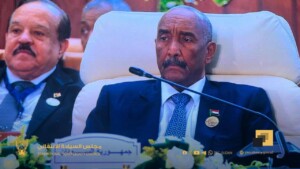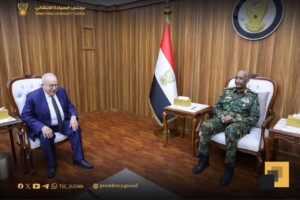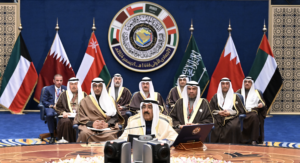Juba Peace Agreement to be signed despite rebel holdout
Members of the South Sudanese mediation team and the delegation of the Sudan Revolutionary Front (SRF) rebel alliance have returned to Juba to attend the final signing ceremony of the Juba Peace Agreement that will take place tomorrow, along with a large delegation from Khartoum headed by Sovereign Council Vice President Lt Gen Mohamed Hamdan ‘Hemeti’.
 Negotiations over the Constitutional Document between FFC and SRF in Addis Ababa, July 2019 (Social media)
Negotiations over the Constitutional Document between FFC and SRF in Addis Ababa, July 2019 (Social media)
Members of the South Sudanese mediation team and the delegation of the Sudan Revolutionary Front (SRF) rebel alliance have returned to Juba to attend the final signing ceremony of the Juba Peace Agreement that will take place tomorrow, along with a large delegation from Khartoum headed by Sovereign Council Vice President Lt Gen Mohamed Hamdan ‘Hemeti’.
The government and most armed movements in Sudan will sign the peace agreement on Saturday, with a large regional, international and local presence. All armed movements in Sudan are involved in the peace agreement, except Sudan People’s Liberation Movement-North led by Abdulaziz El Hilu (SPLM-N El Hilu*) in South Kordofan and parts of Blue Nile state and the mainstream Sudan Liberation Movement under the leadership of Abdelwahid El Nur (SLM-AW**).
The signing ceremony will be witnessed by a number of heads of state and governments, and representatives of the African Union and the United Nations.
The head of the mediation committee, Tut Galuak, said in a press conference yesterday that “the mediation will continue to ensure the unsigned movements join,” referring to SPLM-N El Hilu and SLM-AW.
Threat to unity
In Khartoum, the Communist Party of Sudan (CPoS) launched a fierce attack on the Juba Peace Agreement yesterday, calling it a real threat to the unity and future of Sudan, noting that there are movements that did not join the peace platform.
The party’s Political Bureau stated: “The Juba Agreement will not achieve peace. It is a repetition of previous bilateral agreements and partial solutions… at the expense of the issue.”
The parties to the agreement are violating provisions of the Constitutional Document agreed on by the then ruling Military Council and the FFC in August last year, according to the bureau.
The parties to the agreement are seeking to circumvent the transitional period and finalise it by imposing a new political reality, according to the statement. “Allowing them to run for positions of power after the end of the transition period is a clear violation of the provisional agreement,” and a clear effort to “cling to power”.
Article 21 of the Constitutional Charter stipulates that members of the current government will not participate in the general elections after the three-year transitional period.
The party urged the Sudanese people to organise peaceful sit-ins “not only to prevent the abduction of the revolution, but also to prevent the remnants of the former regime from returning to power through the gate of the Peace Agreement”.
According to the statement, the Juba Peace Agreement lacks the required public support in Sudan.
Inclusion of all parties
In Juba, SRF chairman El Hadi Idris said that October 3 will be a great day in the history of Sudan. In a statement yesterday, he said: “The negotiation process, culminating in the final peace agreement, addresses all the real issues that have been a stumbling block to Sudan's stability since independence.”
Idris expressed the aspiration of the SRF, following the signing of the peace agreement on Saturday, to include all parties in order to ensure complete peace by addressing every single issue in the country.
The delegation of Sudanese officials which arrived yesterday, headed by Hemeti, consists of ministers and representatives of the Forces for Freedom and Change (FFC), accompanied by politicians, businessmen, poets, artists, musicians, and journalists.
Sudan Prime Minister’s Advisor for Peace Affairs, Juma Konda, said that delegations will continue to arrive in Juba. They will come from all over Sudan, and especially Darfur, South Kordofan, and Blue Nile state will have significant representation as those states have a great stake in the peace agreement.
Konda stressed that “efforts will continue” to create a comprehensive peace agreement, stating that they “the rest of the armed struggle movements to join in the next few days”.
*In August, SPLM-N El Hilu withdrew from the peace negotiations, it entered separately from the Sudan Revolutionary Front rebel alliance in the South Sudanese capital Juba, in protest against the government delegation chairman, Rapid Support Forces (RSF) Commander Lt Gen Mohamed Hamdan 'Hemeti'.
**Abdelwahid El Nur, founder and head of the mainstream Sudan Liberation Movement, which has still strongholds in Jebel Marra in central Darfur, did not join the peace talks in the South Sudan capital Juba in September last year. El Nur, known as a “serial naysayer” adheres to his position that he will only join negotiations after security and stability have been realised in Sudan’s conflict-torn western region. Displaced still complain about insecurity in Darfur.
Radio Dabanga’s editorial independence means that we can continue to provide factual updates about political developments to Sudanese and international actors, educate people about how to avoid outbreaks of infectious diseases, and provide a window to the world for those in all corners of Sudan. Support Radio Dabanga for as little as €2.50, the equivalent of a cup of coffee.












 and then
and then